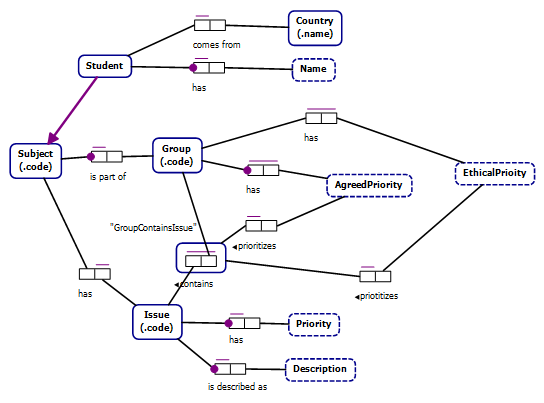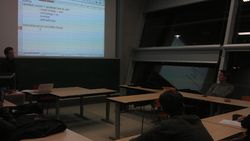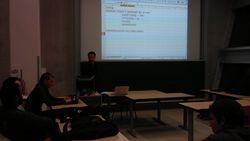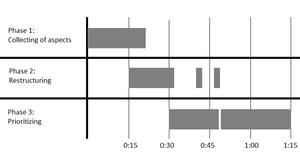Onderzoeksmethoden 2/het werk/2011-12/Group 3
Inhoud
Subject
"What is important for users of public-transportation in the Netherlands"
Research Methods
- Workshops
Concept Map
- Subjects
- Subject background
- Issues
- Issue priority
Target group/subjects
Our main focus is to research the difference - if any - between foreign and domestic students in the way they prioritize issues important for properly functioning public-transportation system.
Approach
We have decided that we will supply them with a minimum list which we expect them to order and extend if they deem necessary.
ORM Model
Research Subjects
In order to compare domestic to foreign students, we've decided to form two groups. For each group we held a workshop.
| Workshop #1 | Workshop #2 |
|---|---|
| Dutch students | Foreign students |
In order to rule-out any differences in bargain power between students, we've decided that the workshops to be held in the motherly tongue of the participants, if possible. This way we anticipate a more fair outcome. Therefore, for the Dutch students the workshop was held in Dutch, and for the international students the workshop was held in English, as international students are used to speak English.
Before we set up appointments, we estimated, if students for each focus group would like to participate in our workshops. We expected Dutch students to be easy to get as participants, as many of them can be found at the University. For the international students, we asked a few, and generally got positive feedback about their willingness to attend. Further, to motivate students in participating, we provided drinks and food for free to all attendees.
Planing
| Date | Activity |
|---|---|
| week 41 | supplemental wiki content |
| week 42 | Starting to gather people for the workshops |
| week 43 | Fixing a date with all participants |
| week 45: November 10 | Workshops for Dutch students |
| week 46: November 16 | Workshops for foreign students |
Preliminary issues contributed to start the conversation
- Prices
- Stricktness of the TimeTable adherence
Preliminary Statements to start conversation
- The trains always ride exactly like the timetable
- The different transportation services have an outstanding cooperation between time-tables
- The Ticket prices are way to cheap.
- The bus drivers are always very kind to me
- The busses have plenty of room for all travelers
Results
Results Dutch group
http://www.youtube.com/embed/u0VVrexpO8U?hl=nl&fs=1
This video shows a Time-laps of the meeting.
The Frist collumn (A) shows the priority, which is later on set by the participants.
In the end the participants provided the following prioritization:
- Costs
- Frequency (how often the vehicles depart)
- Reliability (vehicles arrive/depart in time)
- Connections with other means of public transport
- Travel time (busses compaed to cars)
Roughly 15 minutes before the end of the workshop, the term Ethics was mentioned. The participant who mentioned it, stated that "of course" accessibility is very important, but not to him personally. We decided to add another column to prioritize the items for the Dutch community, rather than Dutch students. This resulted in the following order:
- Accessibility (information read out loud, wheelchair facilities)
- Dependancy of OV Chipcard (waiting times, service)
- Pricing
- Frequencey / Connections / travel time (compared to cars)
The workshop took approximately one hour.
Results Foreign group
Time-lapsed progress of the workshop: http://www.youtube.com/embed/M0zkOL9ULQ0?hl=nl&fs=1
Research Subjects origin:
- 1x Italian
- 2x German
- 1x Belgian
In the end the participants provided the following prioritization:
- Safety
- Costs / Pricing
- Reliability
- Connection / Waiting times
- Availability
Similar to the first workshop with the Dutch students, the international students came up with similar ethical aspects:
- Costs / Pricing
- Safety
- Reliability
- Feeling safe
- Accessibility for handicapped passengers
The workshop took approximately one hour and fifteen minutes.
Praticallities of the workshop
During the workshop, every group member had specific role, totally resulting in 4 roles:
- Facilitator
- Cameraman / secretary
- Clerk (operating the computer connected to the beamer)
- Photographer/ secretary
During the Dutch workshop the roles where devided as following:
Facilitator: Vincent Cameraman: Mark Monitoring: Jonas Clerk: Edwin
During the foreign workshop the roles where devided as following:
Facilitator: Mark Cameraman: Vincent Monitoring: Edwin Clerk: Jonas
We rotated the roles so everyone had a similar input consearing the workshop.
During the workshops, the clerk assisted the facilitator by asking sometimes the attendees to clarify their statements.
Workshop Phases in practice
prior to the workshop, we thought of three basic phases the workshop would consist of:
- Collecting of aspects (divergence)
- Restructuring of aspects
- Prioritizing of elements
Collecting of aspects
The facilitator started the conversation by asking the participants to name some topics (top of mind) concerning public transportation in the Netherlands. After they exhausted their initial ideas, our workshop continued with presenting them several generic statements to keep the conversation going. These statements we prepared beforehand, and were mainly used to guide through the first phase of the workshop.
Using these example statements, we made sure that we could compare the results (as similar items would be added), while also using the inital thoughts from the group.
Restructuring aspects
After collecting items, we asked the participants to prioritize the collected items (phase 3). The group noticeted that there were some topics which were so similiar that they should be merged (phase 2) into one. This proved to be quite difficult, as not everyone used the same definition of items. During this process some topics where added as well as a result of recollection.
A audio recording snippets of this behavior: http://soundcloud.com/edwinvandergraaf/prior-snippet-dutch/s-6t34i
Prioritizing of elements
During the final phase we asked the participants to name the most important items, which instantly started a discussion in both workshops. In some cases more re-structuring had to take place, and we also jumped back to the least important item a few times to give the participants some more time to think about the other (more important) items.
Below you can see how the iterative process took place during the workshop, this is both for the group with foreigners and domestic student.
Reflection
This paragraph is a reflection on how both workshops went, from our own view as organizers of the workshop.
Workshop 1: Dutch students
The first workshop started off well, with many ideas and input from all subjects. The main reason for this could be the fact that most subjects already knew each other from previous courses. It seemed relatively easy to keep the conversation going, but making sure everyone was able to share their opinion was harder at times: some people were better at expression their opinion than others.
Workshop 2: Foreign students
The second workshop was a bit harder to facilitate; the students did not know each other and couldn't discuss in their native language. This resulted in some silences and subjects struggling to find the right words. When the workshop progressed, everyone opened up a bit; the main discussion was held in the final phase of the workshop. The final result was agreed on by all subjects, and we were satisfied by this result.
Conclusions
Criteria
- Amount of issues
- Items between groups
- Comparison between whole list
- Comparison between first 5 items
- Our expectations
Results
Although it not easy to draw conclusions from only two relatively short workshops, we did find some interesting differences and similarities similarities. The most obvious difference, is the fact that Dutch students did not mention safety at all, whereas the foreign students found it the most important item. Another difference between the two workshops is the fact that Dutch students found accessibility the most important etchical item, whereas foreign students put 4 items above it.
Pricing, connections with other means of public transport as well as reliability are considered important by domestic as well as foreign students.




